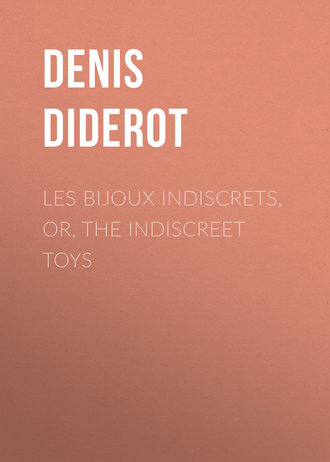 полная версия
полная версияLes Bijoux Indiscrets, or, The Indiscreet Toys
Mangogul was puzzling himself with such reflections, when he found himself in the middle of his academy. Orcotomus had for spectators, as appears, all those in Banza, who were knowing in the subject of Toys. In order to be satisfied with his audience, all he wanted was to give them satisfaction: but the issue of his experiments proved very unhappy. Orcotomus took up a Toy, put his mouth to it, blew into it till he was out of breath, quieted it, returned, tried another: for he had brought a variety of them with him, of all ages, sizes, conditions and colours: but in vain did he blow; nothing was heard but inarticulate sounds, vastly different from what he had promised.
Then ran a buzzing murmur thro' the company, which disconcerted him for a moment: but he recovered himself, and alledged that such experiments were not easy to be made before so great a number of people: and he was right.
Mangogul got up in wrath, went away, and in the twinkling of an eye was in the favorite Sultana's appartment. "Well, prince," said she upon seeing him, "who has won the day, you or Orcotomus? For his Toys have performed wonders to be sure." The Sultan took some turns about the room without a word of answer. "But," resumed the favorite, "your highness seems dissatisfied." "Oh! madam, the impudence of that Orcotomus is not to be match'd. Pray, do not so much as mention him from this moment – What will you say, O future generations, when you shall be informed, that the great Mangogul allowed a hundred thousand crowns in yearly pensions to such fellows; while gallant officers, who with their blood had watered the laurels that surround his brow, were reduced to twenty pound a year? – By Jove, the thought distracts me: I shall be out of humor this month to come."
Here Mangogul broke off, and continued to walk about the room. He hung down his head, marched to and fro, stop'd, and now and then stamp'd the floor with his foot. He sat down a moment, rose up in a hurry, took his leave of Mirzoza, forgot to kiss her, and retir'd to his own appartment.
The African author, who has immortalized himself by the history of the high and marvellous exploits of Erguebzed and Mangogul, continues in these words:
By Mangogul's ill humor it was thought, that he was on the point of banishing all the learned out of his dominions. Far from it, the next day he arose in a gay mood, performed his exercises at the riding-house in the morning, in the evening supp'd with Mirzoza and some favorites, under a magnificent tent in the gardens of the Seraglio, and never appeared more disengaged from affairs of state.
The dissatisfied and the disaffected of Congo, and the newsmongers of Banza, did not fail to spread their reports of this conduct. For what do not people of this stamp find fault with? "Is this," said they in the public walks and coffee-houses, "is this governing a state? To spend the day in tilting, and the night at table." "Well, if I was Sultan," cried a little Senator ruined by gaming, parted from his wife, and whose children had the worst of education, "if I was Sultan, I would make Congo a flourishing empire. I would be the terror of my enemies, and the darling of my subjects. Within six months I would reestablish the Police, the laws, the army and the navy in their full vigour. I would have a hundred ships of the line. Our heaths should soon be grub'd up, and our high-ways repair'd. I would abolish the taxes, or at least reduce them to one half. As for pensions, gentlemen of sublime wit, by my faith, ye should but just taste them with the tip of your tongues. Good officers, Pongo Sabiam, good officers, old soldiers, magistrates like us, who devote our labours and night studies to dealing out justice to the people; these are the men on whom I would shed my bounty."
"Gentlemen," said an old toothless politician, with greasy flat hair, a coat worn out at elbows, and ragged ruffles, "have ye quite forgot our great emperor Abdelmalek, of the Dynasty of the Abyssinians, who reigned two thousand three hundred and eighty five years ago? Have ye forgot how he caused two astronomers to be impaled, for an error of three minutes in their prediction of an eclipse; and his first physician and surgeon to be dissected alive, for having ordered him a dose of manna at an improper time?"
"Moreover I ask you," continued another, "what are those idle Bramins good for, that vermin who suck our blood, and grow fat on it. Would not their immense overflowing riches better become honest folks like us."
From another quarter was heard: "Forty years ago, were the new cookery and the liquors of Lorraine so much as known? Our rulers are plung'd deep into luxury, which threatens approaching destruction to the empire, a necessary consequence of the contempt of the Pagoda's and dissolution of morals. At the time when people eat but coarse meats, and drank but sherbet at Kanaglou's table; what regard would be paid to the cut-paper ornaments, to Martin's varnishes, and to Rameau's music? The opera girls were not more cruel then than at present, and were to be had much cheaper. The prince, you see, spoils many good things. But if I was Sultan – "
"If thou wert Sultan," answered in wrath an old officer, who had escaped the dangers of the battle of Fontenoy, and had lost an arm close to his prince in the fight of Laufelt; "thou wouldst commit greater impertinences than thou now dealst out. Eh, friend, thou can'st not govern thy tongue, and thou wouldst willingly rule an empire: thou hast not sense to manage thy family, and thou pretendst to guide a state. Respect the powers of the earth, and thank the Gods for having given thee birth in the empire, and in the reign of a prince, whose prudence instructs his ministers, and whose soldiery admire his valor; who has made himself dreaded by his enemies, and beloved by his people; and whose only fault is the lenity with which persons of thy stamp are treated under his government."
CHAP. XV.
The Bramins
After the learned had spent themselves on the Toys, the Bramins took possession of them. Religion laid claim to their chit-chat, as a subject that came within its jurisdiction, and its ministers pretended that the hand of Brama manifested itself in that work.
There was held a general assembly of Pontiffs, and a resolution was taken to employ the best pens to prove in form, that the thing was supernatural, and that, till their works could be published, it should be defended by way of theses in the schools, in private conversations, in the direction of consciences, and in public harangues.
Now, altho' they unanimously agreed that the thing was supernatural; yet as the people of Congo admitted two principles, and professed a sort of Manicheism, they were divided in opinion, to which of these two principles the chit-chat of the Toys ought to be attributed.
Those who had seldom or never been out of their cells, and had turned over nothing but their books, ascribed the prodigy to Brama. "There is none but he," said they, "that can interrupt the course of nature; and time will shew, that in all this he has most profound views."
Those on the contrary, who frequented the toilets, and were oftner surprized at bed-sides than in their closets, fearing lest some indiscreet Toy or other might unveil their hypocrisy, laid their prattle to the charge of Cadabra, a mischief-making deity, and a sworn enemy to Brama and his servants. This latter system was exposed to terrible objections, and had not so direct a tendency towards the reformation of morals. Nay, its defenders did not impose on themselves about it. But the business was, to screen themselves: and in order to compass that, religion had not a single minister, who would not have sacrificed the Pagodas and their Altars a hundred times over.
Mangogul and Mirzoza assisted regularly at the religious service of Brama, and the whole empire was informed thereof by the news-papers. On a certain day appointed for celebrating one of the principal solemnities in the great Mosq, they were present. The Bramin, whose turn it was to explain the law, mounted the rostrum, pour'd forth a volley of affected phrases and fulsome compliments on the Sultan and his favorite; and made an eloquent peroration on the manner of sitting orthodoxly in company. He had already demonstrated the necessity thereof by numberless authorities, when being instantaneously seized with a fit of sacred enthusiasm, he spoke this declamation, which had the greater effect, as it came in quite unexpected.
"What do I hear in all assemblies? a confused murmur, an unheard noise strikes my ears. All things are turn'd topsy-turvy, and the faculty of speech, which the goodness of Brama had hitherto appropriated to the tongue, is now by an effect of his vengeance transported to other organs. And what organs? You know, gentlemen. O ungrateful people, was there a necessity for a new prodigy, to rouze ye from your lethargy; and had not your crimes witnesses enough, but their principal instruments must raise their voice? Doubtless their measure is filled up; since the wrath of heaven has sought new chastisements. In vain did you envelop yourself in darkness, in vain did you choose mute accomplices: do you not hear them at present? They have given depositions against ye from every quarter, and revealed your baseness to the universe. O thou who governest by thy wisdom! O Brama! just are thy judgments. Thy law condemns theft, perjury, lying and adultery: it proscribes the blackness of calumny, the intrigues of ambition, the fury of hatred, and the artifices of insincerity. Thy faithful ministers have not ceased declaring these truths to thy children, and threatening them with the chastisements, which thou in thy just anger reservedst for prevaricators: but in vain; the fools have delivered themselves up to the tide of their passions, they followed the torrent, they have despised our admonitions, they have laughed at our threats, they have regarded our anathema's as empty noise; their vices are accumulated, strengthen'd, multiplied; the voice of their impiety has ascended even to thy throne, and we have not been able to prevent the tremendous scourge, with which thou hast smote them. After having long implored thy mercy, let us now extoll thy justice. Overwhelmed by thy strokes, doubtless they will return to thee, and acknowledge the hand which is laid heavy on them. But O prodigy of hardheartedness! O excess of blindness! They have imputed the effect of thy power to the blind mechanism of nature. They have said in their hearts, Brama is not. All the properties of matter are not known to us, and the new proof of its existence is but a proof of the ignorance and credulity of those, who object it to us. On this foundation they have raised systems, invented hypotheses, tried experiments: but from the highth of his eternal habitation, Brama has laugh'd at their vain projects. He has confounded audacious knowledge, and the Toys have broke, as glass, the impotent obstacles opposed to their loquacity. Wherefore let those vainglorious worms confess the weakness of their reason, and the vanity of their efforts. Let them cease to deny the existence of Brama, or to prescribe limits to his power. Brama is, he is almighty, and he does not shew himself to us more visibly in his dreadful scourges, than in his ineffable favours.
"But who has drawn down these scourges on this wretched country? Is it not thy injustice, greedy incredulous man? Thy gallantries and silly amours, worldly immodest woman! Thy excesses and shameful debaucheries, infamous man of pleasure! Thy hardheartedness for our monasteries, miser! Thy injustice, corrupt magistrate! Thy usuries, insatiable money-dealer! Thy effeminacy and irreligion, impious and sycophant courtier.
"And you, on whom this scourge is particularly fallen, women and maidens plunged into licentiousness; tho' we, renouncing the duties of our calling, should keep profound silence with regard to your irregularities, you carry about you a more importunate voice than ours: it accompanies you, and will every where rebuke you for your impure desires, your equivocal connections, your criminal conversations, such excessive care to please, so many artifices to engage, so much address to fix, and the impetuosity of your transports, and the fury of your jealousy. Why then do you delay to shake off the yoke of Cadabra, and return under the mild laws of Brama? But let us return to our subject. Well then I was saying that worldlings sit down heretically, and that for nine reasons; the first, &c."
This discourse made very different impressions. Mangogul and the Sultana, who were the only persons that knew the secret of the ring, were convinced that the Bramin had as happily hit off the tattle of Toys by the assistance of religion, as Orcotomus by the light of reason. The court ladies and petits-maitres declared the sermon seditious, and the preacher a visionary. The rest of the audience esteem'd him a prophet, shed tears, fell to prayers, and even flagellations, and did not change their courses of life.
The noise of this sermon spread to the very coffee-houses. A wit pronounced in a decisive tone, that the Bramin had but very superficially handled the subject, and that his discourse was but a cold insipid declamation: but in the opinion of the devout women and the enlightened, it was the most solid piece of eloquence that had been delivered in the temples these hundred years. And in mine, both the wit and the devout women were in the right.
CHAP. XVI.
The Muzzles
While the Bramins were making Brama speak, airing their Pagoda's by processions, and exhorting the people to repentance; others were thinking how to reap benefit by the prattle of Toys.
Great cities swarm with persons, whom misery renders industrious. – They neither rob nor pick pockets: but they are to pick-pockets, what pick-pockets are to gamblers. They know every thing, they do every thing. They go up and down, they insinuate themselves. They are found at court, in the city, at Westminster hall, at church, at the play, at ladies toilets, in coffee-houses, at balls, opera's and in academies. They are any thing that you would have them be. Do you sollicit a pension, they have the minister's ear. Have you a law-suit, they will sollicite for you. Do you love gaming, they will make a party with you; good chear, they keep a good kitchen; women, they will introduce you to Amina or Acaris. From which of the two would you please to purchase the distemper? Take your choice, they will undertake your cure. Their chief occupation is to find the ridicules of private persons, and to make advantage of the follies of the public. From them it is, that papers are distributed in the streets, at the gates of temples, at the play-house doors, and other public places, by which you are advertised gratis, that such an one living at the Louvre, St. John's, the temple, or the abby, at such a sign, dupes mankind at home from nine in the morning to noon, and abroad the rest of the day.
Scarce had the Toys began to speak, when one of these sharpers fill'd the houses of Banza with a printed bill of this form and tenor. – Advertisement to the ladies. And underneath in small Italic, by permission of my lord the great Seneschal, and with the approbation of the gentlemen of the royal academy of sciences. And lower down: The Sieur Eolipila of the royal academy of Banza, Member of the royal society of Monoémugi, of the imperial academy of Biafara, of the academy of the curious of Loango, of the society of Camur in Monomotapa, of the institute of Ereeco, and of the royal academies of Beleguanza and Angola; who has for many years given courses of baubles, with the applause of the court, the town, and the province; has, in favour of the fair sex, invented muzzles or portable gags, which deprive Toys of the use of speech, without obstructing their natural functions. They are neat and convenient. He has some of all sizes, of all prices, and for all ages: and he has had the honour to serve persons of the highest distinction with them.
There is nothing like being a member of a body of men. Be a work ever so ridiculous, it is puff'd into success. Thus it was, that Eolipila's invention gain'd ground. People flock'd to his house. The gay ladies went thither in their own equipages, prudent women in hackney-coaches; the devouts sent their confessors or footmen, and nuns their door-keepers. Every body must have a muzzle, so that not one from the dutchess down to the cobler's Joan, but had one either for the fashion or for reasons.
The Bramins, who had declared the prattle of Toys to be a divine punishment, and flatter'd themselves with a reformation of manners and other advantages from it, could not without horror see a machine, which eluded the vengeance of heaven and their hopes. Scarcely had they come down from their pulpits, but they mount again, thunder, roar, make the oracles to speak, and pronounce that a muzzle is an infernal machine, and that there is no salvation for those who shall use them. "Carnal women, quit your muzzles; submit," cried they, "to the will of Brama. Permit the voice of your Toys to awaken that of your consciences, and blush not to acknowledge crimes, which you have not been ashamed to commit."
But their exclamations were of little avail: the same fate attended muzzles, that had formerly attended the gowns without sleeves. The preachers were left to catch cold in the temples. All the women took gags, and quitted them not, either till they found them useless, or were tired of them.
CHAP. XVII.
The two Devouts
For some days past the Sultan left the Toys at rest. Important affairs, on which he was busy, suspended the effects of his ring. In this interval it was, that two women of Banza made diversion for the whole town.
They were professed devouts. They had managed their intrigues with all possible discretion, and were in full enjoyment of a reputation, which even the malice of those of their own class paid respect to. In the mosques nothing was talk'd of but their virtue. Mothers proposed them as patterns to their daughters, and husbands to their wives. The principal maxim of both was, that scandal is the greatest of all sins. This conformity of sentiments, but above all, the difficulty of edifying a clear-sighted and crafty neighbour at an easy expence, had got the better of the difference of their tempers, and they were very good friends.
Zelida received Sophia's Bramin: and it was at Sophia's house that Zelida confer'd with her director; and by a little self-examination, the one could hardly be ignorant of what concerned the other's Toy: but the whimsical indiscretion of these Toys kept them both in cruel apprehensions. They held themselves as on the point of being unmask'd, and of losing that reputation of virtue, which had cost them fifteen years dissimulation and management, and which now embarassed them very much.
At some moments they would even forfeit their lives, especially Zelida, to be as much blasted as the greatest part of their acquaintance. "What will the world say? What will my husband do? – What! that woman so reserved, so modest, so virtuous, that Zelida, like others, is but – Alas! this thought distracts me! – Yes, I wish I never had any reputation," cried Zelida in a passion.
She was then with her female friend, who was making the same reflections, but without such violent commotion. Zelida's last words made her smile. "Laugh, madam, without constraint. Burst out," said Zelida, touched to the quick. "To be sure you have good cause." "I am as sensible of the impending danger, as you can be," answered Sophia, with an air of indifference; "but how to shun it? For you will agree with me, that there is no likelyhood that your wish will be accomplish'd."
"Contrive an expedient then," replied Zelida: "Oh!" said Sophia, "I am tired of rummaging my brain, I can find none. – To bury one's self in a country seat, is one way; but to abandon the pleasures of Banza, and renounce life, is what I will never do. I perceive that my Toy will never approve it." "What is to be done then?" "What! to leave all to providence, and laugh, as I do, at what the world will say. I have tried all shifts to reconcile reputation with pleasures: but since it is decreed that we must renounce reputation, let us at least preserve pleasures. We were uniques: but now, my dear, we shall be like a hundred thousand others; do you look on this as a hard fate?"
"Yes, without doubt," replied Zelida; "to me it seems hard to be like those, for whom I had put on a sovereign contempt. In order to avoid this mortification, methinks I would fly to the world's end."
"Set out, my dear," continued Sophia; "for my part, I stay – But à propos, I advise you to furnish yourself with some secret, to prevent your Toy from blabbing on the road."
"Indeed," replied Zelida, "pleasantry here has a very ill grace, and your intrepidity – "
"You are mistaken, Zelida, there is not a grain of intrepidity in my proceeding. To let things go their own way, when we cannot stop them, is resignation. I see that I am to be dishonoured: well then, dishonour for dishonour, I shall spare myself as much of the uneasiness as I can."
"Dishonour'd!" replied Zelida, bursting into tears. "Dishonour'd! What a shock! I cannot bear it. – Oh! accursed Bonza, 'tis thou that hast ruin'd me. I loved my husband, I was born virtuous; I should have loved him still, if thou hadst not made a wicked use of thy ministry and my confidence. Dishonour'd, dear Sophia! – "
She had not power to make an end. Sobs intercepted her words, and she fell on the carpet, quite in despair. As soon as Zelida recovered her speech, she cried out in a lamentable tone: "Alas! my dear Sophia, I shall die – I must die. No, I shall never survive my reputation."
"But Zelida, my dear Zelida, do not be in a hurry to die: perhaps," said Sophia – "No perhaps shall stop me, I must dye." – "But perhaps one might" – "One might do nothing, I tell you" – "But speak, my dear, what might one do?" – "Perhaps one might hinder a Toy from talking." "Ah! Sophia, you endeavour to comfort me by false hopes, you deceive me." "No, no, I do not deceive you; only hear me, instead of distracting yourself like a mad creature. I have heard talk of Frenicol, Eolipila, gags and muzzles." "Pray, what connexion is there between Frenicol, Eolipila, muzzles, and the danger which threatens us? What business has my Toyman here, and what is a muzzle?"
"It is this, my dear. A muzzle is a machine invented by Frenicol, approved by the academy, and improved by Eolipila, who claims the honour of the invention." "But pray, this machine invented by Frenicol, approved by the academy, and improved by that silly fellow Eolipila." – "Oh! you are of a vivacity that surpasses imagination. Well then, this machine being applied to a Toy, renders it discreet in spite of its teeth." – "Can this be true, my dear?" "It is so said." "We must know it," replied Zelida, "and immediately too."
She rang, one of her women appeared, and she sent for Frenicol. "Why not for Eolipila?" said Sophia. "Frenicol is less taken notice of," answered Zelida.
The Toyman came away with the messenger. "Ah! Frenicol, are you there," said Zelida, "you are welcome. Make haste, my friend, to extricate two women out of cruel anxiety." – "What is the business, ladies? Would you please to have some rare Toys?" – "No, we have two already, and we would willingly" – "Part with them, I suppose. Pray, ladies, let me see them, I will take them, or we will make an exchange." – "You are mistaken, Mr. Frenicol, we have nothing to truck." – "Well, I understand you, you have some ear-rings, which you would desire to lose, so as that your husbands may find them in my shop." – "Not that neither; pray, Sophia, inform him of the matter." "Frenicol," continued Sophia, "we want two – What, don't you understand?" "No, madam: how would you have me understand, when you say nothing?" – "'Tis," said Sophia, "because when a woman is modest, it gives her pain to speak plain on certain things." "But yet," replied Frenicol, "she must speak plain. I am a Toyman, not a Conjuror." – "You must guess however." – "Faith, ladies, the more I look on ye, the less I comprehend ye. When a lady is young, rich, and pretty as you are, she is not reduced to artifice: moreover, I declare sincerely, that I sell them no longer. I have left the dealing in those baubles to young beginners in the trade."
Our devouts found the Toyman's mistake so ridiculous, that they both burst out into a violent fit of laughter, which disconcerted him. "Permit me, ladies, to make my bow, and withdraw. You might well have spared yourselves the trouble of sending for me three miles off, to divert yourselves at my cost." "Stop, stop, friend," said Zelida, still laughing on. "That was not our intention. But by your misapprehending us, such ridiculous notions came into your head." – "'Tis in your power, ladies, to put juster into it. What is the business?" "Oh! Mr. Frenicol, let me laugh at ease, before I answer you."









